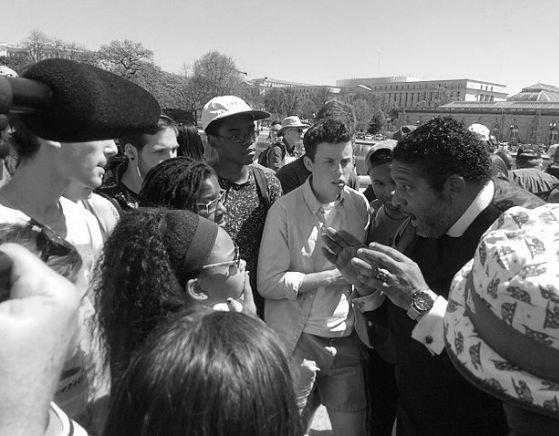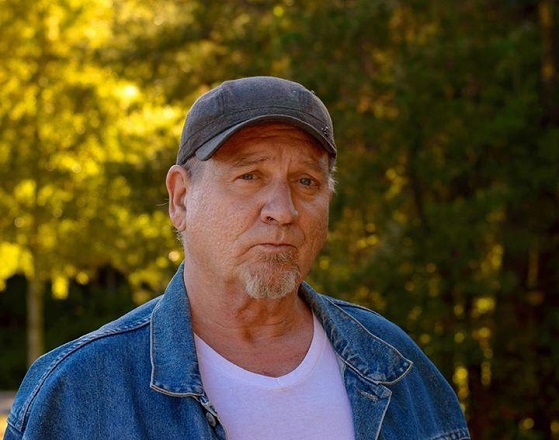A Story About Top-Down Forays into Campaigns for Social and Economic Justice.

{source}
The Kairos Center for Religions, Rights and Social Justice, along with the Anti-Poverty Network of New Jersey, selected me to represent my state at the launch of the 2018 Poor People’s Campaign commencing on May 11th in Washington D.C. with 40 days of civil disobedience.
On the train ride there, I got a text message from a homeless man in his late twenties letting me know that he just got a job stacking shelves at night in a department store. The young man is homeless in part because he was raised by an abusive, alcoholic father. As a result, he lacks self-esteem and self-confidence in social settings, including work.
I knew that the job would not pay well enough to allow him to afford indoor housing, but it was still a step in the right direction. So I supported and encouraged him to try to make it work. I also kept him updated throughout the weekend on what was going on in D.C. It made him feel as though there were people looking out for him, and reminded me who and what we were campaigning for.
We — representatives of 31 states — checked into the Washington International Hostel in downtown D.C. on Sunday May 10th.
On the first night of our stay, we attended a mass meeting (as our itinerary described it) at the National City Christian Church. We walked there. On the way, I noted four or more impressive looking Christian churches of various denominations. But none was more impressive than the National City Church. In fact, it was an epic cathedral.
I recognized it as the place where, on TV, members of our political elites get married and eulogized.
It was the first time I heard the Reverend William Barber speak, or orate I guess is the better term. This was also very impressive. Not only could he orate well, he was also very specific and well-informed about why we have systemic poverty in America.
Same with Liz Theorosis from the Kairos Center, who also spoke about the nuts and bolts of poverty in America — 140 million American living in poverty — and orated about it impressively.
So I expected that after we got passed the pep rally aspect of being anti-poverty advocates, we’d get down to the real business of doing some specific things to counteract this.
I can’t say that I was surprised that we/they didn’t. By necessity, not choice, I work with religious advocates for the poor and homeless on a regular basis. By default, they are usually the only ones who seem to care about this issue. But they talk and pray over the poor and homeless.
If half of the large, well-appointed churches in D.C. opened a wing of their operations to shelter and provide services to the homeless — and there are lots of them on the streets — it would go a long way toward significantly reducing the problem and providing some real relief.
The next day, Monday May 11, was when we would start the civil disobedience. We were instructed on what to do: stop traffic on the street in front of the Capitol and allow ourselves to be arrested without physical resistance. They also informed us that we would each receive a fine of $50.00 for our misconduct, and that the Kairos organization would pay for it.
I chose not to participate. For one thing, it was a choreographed act, not spontaneous, and secondly, there were more than 300 of us doing this. That meant $15.000.00 in fines that really seemed more like a passive donation to the police.
I could have used that kind of money to put a down payment on an emergency housing facility in the community where I live so that people like the young man I mentioned earlier could have a safe and secure place from which to get their lives back on track and permanently move out of poverty.
I also did not put on a black and yellow T-shirt that read The 2018 Campaign for the Poor: A Moral Revival.
Instead, I wore a shirt promoting KYDS: Konscious Youth Development and Services, a community-based program I participate in Asbury Park, NJ, which provides young adults living in poverty with practical life skills so that they can break the cycle of poverty, violence and criminality they grew up in. We were given talking points to tell the media, if asked.
If asked, I would tell them I came here to support community-based programs like KYDS that did the real hard grassroots work of changing lives for the better, one person at a time.
The poet Muriel Rukeyser wrote, “The universe is made of stories, not atoms.”
So I will leave you with a story that I feel speaks volumes about top-down forays into campaigns for social and economic justice. In the time-honored tradition of the new journalism that broke out in the 60’s and 70’s as practiced by Normal Mailer, Hunter Thompson, Tom Wolfe and others, I embedded myself in the story in order to get the whole picture of what was happening, and not just report the party line.
At a certain point, the police stopped demonstrators from entering the place where the civil disobedience was taking place. Because I was not dressed like the other demonstrators, I was able to get past them and get near where the arrests were being made, in a nearby park. Several buses full of police were there, I assumed, to cart the demonstrators away to a police station.
When I asked a cop why they were doing it in the park, he said, “We were expecting a lot more people to show up. With a small group like this, we can just book and release them on the spot.” (And take your $50.00 donations. Thank you very much, and come back soon.)
Later that day, organizers of the campaign told us that the police arrested and processed the demonstrators in the park because there were too many to take to a police station.
After talking to the police, I went and sat down on a bench about a 100 yards from where the demonstrators were being processed. I noticed a Muslim woman stopping a police SUV and frantically banging on its driver-side window until a cop opened it. When she finished and walked toward where I was sitting with some locals, I said, “You have to tell us what that was all about.”
She pointed back in the direction where the demonstrators began their march. “Look,” she said, “It’s Rabbi Arthur Waskow. He marched with Dr. King 50 years ago at the original Poor People’s Campaign.”
The temperature was in the 90s and relentlessly sunny. The 85-year-old rabbi was being helped to sit on a bench next to mine. When he sat down — looking disoriented and exhausted — the police from the SUV came over and offered him bottled water while the Muslim woman and another woman dressed in Christian garb — white collar — fanned him.
I asked the Muslim woman what happened. It was obviously not a good day for an 85-year-old man to be walking around by himself in the mid-day heat. She said, “He was walking slowly toward the event with the support of the other clergy. But when the commotion started and TV crews and reporters showed up, they just left him there on his own.”
A moral revival, indeed.
***
{Join us on Facebook, Twitter, Instagram & Pinterest}

